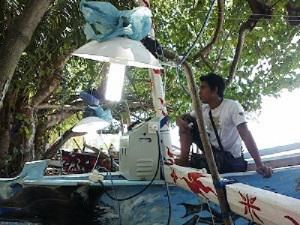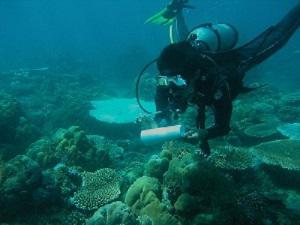Jensi Sartin
Other projects
5 Oct 2009
Development of Community Based Tourism in Bondalem Village, Bali Province, Indonesia, as Part of Bondalem Marine Manage Area (MMA) Threats Control and Management
This project aims to reinforce and sustain the MMA, by developing community based tourism that can provide an alternative income, promote more sustainable tourism and fishing practices, as well as developing tools for the community and build their capacity to raise funds for the MMA management.

Visitor facility energy storage that installed on fisherman boat.
The reefs of Bondalem are part of the Bali coral reef distribution network. The reefs here are threatened by unfriendly marine ornamental fish collection, cyanide fishing, solid waste, sedimentation, and erosion. Reef Check Foundation Indonesia (RCFI) works here to introduce friendlier fishing techniques and better coastal management.

Regular biophysical monitoring bleaching survey.
Under the first RSG, RCFI established and started enforcing the Marine Management Area (MMA), building local capacity in management, diving and handling funds. Now, we seek to reinforce and sustain the MMA, by developing professional marketing packages, government approved guide programs and sustainable financing mechanisms, while collaboratively building up scientific biophysical information to be shared with visitors and stakeholders.
The project is design to achieve:
1. Economic benefits to local communities: Community based tourism is a powerful tool to overcome the issue which can provide alternative livelihood/job for the community
2. Sustainability of the MMA: No single source of financing will be able to cover on long term and reliable basis the cost to management. Income from tourism can be managed to also provide part of the conservation funds needed for the MMA.
3. Environmental awareness: The MMA can show that there is a major incentive for the local people, this will increase awareness of the importance to protecting the area and encourage replication in other areas.
Project duration is July 2011 to September 2012. The activities are:
1. Regular biophysical monitoring collaborating with local fishermen, tourism operators and educational institutions.
2. Market research and demand analysis to identify target segments, ecotourism potential and carrying capacity.
3. Trial and implement government-approved program with regular refresher training for local guides and key persons.
4. Develop promotional strategy and destination image, unique tag line and logo.
5. Design visitor educational tools focusing on environmental impact and responsible site use for specific audiences e.g. children, adults, locals, tourists.
6. Upgrade visitor information facilities
7. Review and refine sustainable financing mechanisms e.g. merchandising, government allocations, fundraising, and guide/tourist fees.
8. Establish a visitor impact monitoring and evaluation program with input from visitors and partners.
9. MMA promotional media trip.